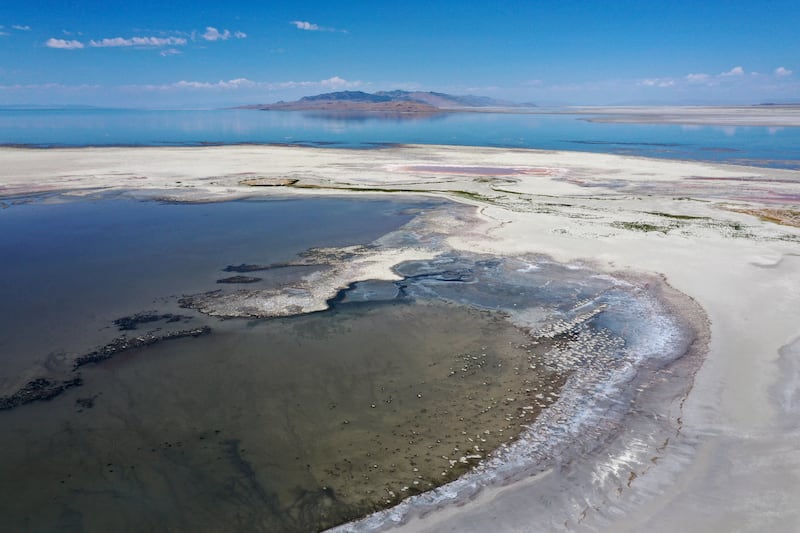The Senate overwhelmingly approved a defense spending bill for fiscal 2023 late Thursday, including some provisions specifically for Utah.
The $858 billion National Defense Authorization Act, or NDAA, passed the Senate 83-11, with Sen. Mitt Romney, R-Utah, voting with the majority and Sen. Mike Lee, R-Utah, voting against. The House passed the bicameral compromise on Dec. 8. It now goes to President Joe Biden, who is expected to sign it.
The record amount exceeds Biden’s proposal by $45 billion and rescinds the COVID-19 vaccine mandate for the military.
The Senate rejected an amendment to the bill that Lee supported that would have reinstated troops discharged for refusing the COVID-19 vaccination, provided them back pay and service time, and prevented the Pentagon from reinstating the vaccine mandate without congressional authorization.
Lee and 10 Republican senators say reversing the COVID-19 vaccine mandate is insufficient “to right the wrongs done to our service members.”
They urged Defense Secretary Lloyd Austin in a letter Friday to establish a quick and thorough process to reinstate service members who were discharged for refusing the vaccine with back pay and full benefits. The also asked him to freeze all COVID-19 vaccine-related discharges.
“Thousands of brave men and women were harmed because of the Pentagon’s misguided approach to the COVID-19 vaccine requirement,” the senators wrote. “You have the opportunity to immediately begin undoing the harm caused.”
Romney applauded the passage of the bill, calling it one of the most important pieces of legislation Congress passes each year. It contains several items he pushed for, including the Great Salt Lake Recovery Act, a measure that strengthens his efforts to open a passport agency in Salt Lake City, and legislation to develop a strategy to recycle and recover critical minerals from batteries used in the federal electric vehicle fleet.
“This year’s legislation includes protections against threats from China and Russia, measures to bolster our national defense and support our troops, and additional security assistance for Ukraine,” he said in a statement. “It also includes measures which will decrease our dependence on foreign adversaries like China when it comes to our critical mineral supply.”
Romney said the bill includes several measures that will benefit Utah. Specifically, the legislation:
- Requires a federal strategy to recycle and recover critical minerals from batteries used in the federal electric vehicle fleet.
- Authorizes $10 million for the U.S. Army Corps of Engineers to carry out a Great Basin saline lake monitoring and assessment program for conserving water, and mandates the agency conduct a feasibility study on pipelines and other water-redirecting technologies.
- Requires the Secretary of State to review the geographic diversity of passport agencies to identify areas of the country with both high demand and no in-person access, and further requires a strategy for increasing accessibility for large population centers currently lacking agencies.
Romney said the saline lake study will complement and elevate the work being done by the state to develop a permanent solution to save the receding Great Salt Lake.
In 2021, Romney asked the State Department to open a passport agency in Salt Lake City. People in Idaho, Oregon, Montana, Nevada, Utah and Wyoming must renew their passports by mail or travel long distances to neighboring states to reach the nearest passport offices.
“Utah is rapidly expanding as a center for global commerce and tourism and is home to thousands of Latter-day Saints who annually embark on worldwide religious missions — yet Utahns must travel long distances to reach the nearest passport office,” Romney said.
When the bill was in the House, Rep. Blake Moore, R-Utah, said he successfully pushed for provisions that support Hill Air Force Base and Utah’s defense community, including depot modernization, Utah Test and Training Range improvements, better housing for airmen and full funding for the Sentinel missile program.
Other Romney provisions in the NDAA:
- Authorize up to $1 billion per year for presidential drawdown authority for Taiwan.
- Require the administration to issue a report analyzing how Russia’s war against Ukraine has impacted China’s diplomatic, military, economic and propaganda objectives with respect to Taiwan.
- Requires the president to provide detailed reasons for firing an inspector general 15 days before their termination, and prohibits placing inspector generals on administrative leave during that waiting period except for limited reasons, such as posing a threat to governmental interests.
- Encourage the president to establish a Committee on Global Health Security at the National Security Council and a special representative for global health security and diplomacy at the United States Agency for International Development.
- Require the secretaries of State and Defense to report on any delayed arms deliveries to partners and allies in the Indo Pacific, including Taiwan, Japan, South Korea, Australia, the Philippines, Thailand and New Zealand, and U.S. efforts to speed deliveries as part of an effort to expedite deliveries.


